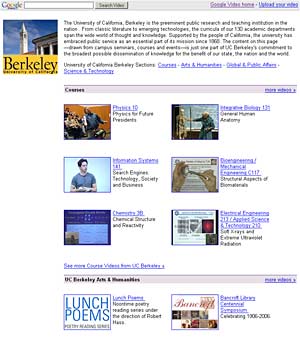UC Berkeley Press Release
UC Berkeley offers courses and symposia through Google Video
BERKELEY – In another innovative move to share its intellectual treasures with the public, the University of California, Berkeley, announced today (Tuesday, Sept. 26) that it is delivering educational content, including course lectures and symposia, free of charge through Google Video.
Because of the quality and quantity of these video offerings, UC Berkeley will be the first university with its own page on the Google Video Web site: http://video.google.com/ucberkeley, campus officials said. The campus is making more than 250 hours of content available to the public through Google Video.
 UC Berkeley's page on the Google Video website features links to top courses, campus events and symposia. |
Google Video is a comprehensive index of free and paid, user-generated and professional video content. Google Video makes it easy for users to discover, watch and share videos and for premium video producers to monetize and distribute their content.
"Google appreciates the opportunity to partner with progressive universities like UC Berkeley to make undiscovered lectures and entire courses available to our users," said Eric Schmidt, chief executive officer of Google, who received both his doctoral degree (1982) and master's degree (1979) from UC Berkeley. "UC Berkeley's content - much of which wasn't easily accessible online - will enhance the comprehensive and diverse range of offerings by Google Video."
Visitors to the new UC Berkeley Web page will be able to view or download a half dozen UC Berkeley courses in their entirety, including "Physics for Future Presidents, "Integrative Biology," and "Search Engines: Technology, Society and Business." Also offered will be a wide range of public events and cutting-edge symposia on everything from climate change to synthetic biology. The campus is set to add further content to the Google Video site in coming months.
This collaboration also strengthens UC Berkeley's position as a leader in knowledge-sharing through open-access online video, campus officials said.
"Google Video presents us with a wonderful opportunity to share UC Berkeley's amazing faculty with a global community of lifelong learners," said Christina Maslach, UC Berkeley vice provost for undergraduate education. "We see this endeavor as one part of our expanding digital bridge that is directly connecting the public we serve with the intellectual riches of the campus."
"Coursecasting" is a growing trend in educational technology, enabling students and the general public to download audio and video recordings of class lectures to their computers and portable media devices. As with UC Berkeley's agreement to deliver podcasts through Apple Computer's iTunes U, the content made available via Google Video will consist mostly of recorded course lectures and special campus events.
Keeping ahead of coursecasting technology, UC Berkeley has been making academic content available to the public since 2001, when its Educational Technology Services (ETS) division began webcasting lectures and special events to students and the public through its Web site. That site will continue to host the full array of the campus's growing inventory of video content supplied by taped events and lecture rooms that are wired for automated webcasting.
"Google Video is a wonderful extension of our open video program," said Obadiah Greenberg, ETS product manager for webcast.berkeley. "The ability of viewers to play back video on a variety of devices; the ease of sharing and embedding videos via e-mail and blogs; and access to community aspects such as user ratings and comments help us to broaden our reach and build community around our video."
Google Video will also make it much easier for the public to access content from UC Berkeley's own Web sites by embedding Google Video's proprietary player that uses the Flash plug-in to stream video. When viewers come to a UC Berkeley page, the video will play without the need to launch or download a special application.
"Before the advent of broadband, only our students or those fortunate enough to attend campus events were able to reap the rewards," said Dan Mogulof, UC Berkeley's executive director of Public Affairs and Google Video project manager. "Now, through our collaboration with Google Video, we can more easily share those resources and bring extraordinary value to the people of California, the taxpayers who help support our institution. This is a perfect example of how technology is expanding our idea of what it means to be a truly public university."
UC Berkeley's arrangement with Google Video is the result of discussions initiated last summer by the campus's Public Affairs office. The Google Video team was led by Philip Inghelbrecht, an alumnus of the Haas School of Business.
"One of the hardest things for me while attending Haas School was choosing classes. The curriculum and professors are so impressive that I always had to make sacrifices when selecting classes," said Inghelbrecht, strategic partner development manager for Google Video. "The relationship between UC Berkeley and Google Video was born from my own experience. Now that many UC Berkeley classes are available on Google Video, we may never have to miss out on a class or professor again."
Google Video partner manager Margaret Healy, also a UC Berkeley alumna, agreed: "I know how my Berkeley education shaped how I view the world, and now more people will be able to have the Berkeley experience. Move over Fox News- now people can watch "Physics for Future Presidents" on Google Video," Healy said.

